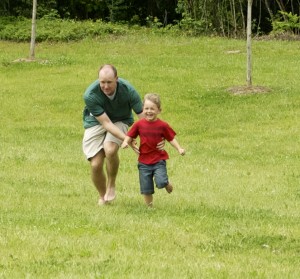Many parents, even many of those who are focused on creating a secure attachment with their child, spank as a form of discipline. They may say things like…
“I only spank when….”
“I only spank after I’ve tried [XYZ] first.”
“Spanking is OK when it’s done [a certain way], but not [a certain other way].”
“We did attachment parenting when our kids were infants (past tense).”
“We follow AP, but believe in strong discipline for obedience.”
“We are AP, except for spanking.”
Attachment parenting is about raising children using parenting methods that strengthen relationships, foster empathy, and teach nonviolent communication. Spanking may elicit appropriate behavior in children, but it is a technique that, no matter how it is administered, does not support a secure attachment; it does not meet kids’ emotional needs, and it functions against the goals of AP (communication, connection).
Attachment parenting has no end date. It is not a stage or a phase, but a mindset. It’s a perspective that permeates the relationship between a parent and child and all of the interactions they have together. So, the parenting goals that AP moms and dads have when their kids are infants are the same goals they have when their kids are older; communication, connection, respectful relationships.
Just because children outgrow infanthood, doesn’t mean they outgrow those needs. And just because parents may be focused on teaching their kids appropriate behavior doesn’t mean they should ignore the principles that drew them to AP in the first place.
The goal of attachment parenting is connection, not obedience. There is simply no attachment-promoting way to spank.
There are, however, attachment-promoting ways to discipline; to teach children those necessary elements of behavioral limits, expectations, and accountability, while still prioritizing the parent-child relationship. Positive discipline accomplishes this. The tools of positive discipline fit well within the context of attachment parenting because they follow the “And” principle…
- I want to teach my kids how to behave appropriately and I want to prioritize our relationship.
- I want my kids to be accountable for their behavior and I want to respect them (their autonomy, their development).
- I want to parent with firmness and kindness.
- I want to let kids know what is expected of them and I want to stay connected to them.
- I want to teach my kids respect and I want to facilitate communication between us.
It is common to equate positive parenting with permissive parenting. As children outgrow the AP practices of infanthood, parents frequently believe that they must “establish control” of their children, expect obedience, and enforce boundaries. For without limits and authority, children “rule the roost,” right?
Yes, children certainly need limits. Yes, they need clear boundaries. Yes, parents must communicate their expectations and hold kids accountable for their behavior. And yes, parents can teach kids these things without punishments, without threats, without inducing fear, and without spanking.
At the start of her 7-week Positive Discipline classes, author and parent educator Jane Nelsen asks parents, “How many of you would try one other parenting tool before you spanked?” Inevitably, every hand goes up. She continues and asks, “How many of you would try two things before spanking?” Hands stay up. “Three things? More?” And still, the hands stay up.
So, many parents are, indeed, aware of the limitations of spanking. Many parents spank because they are exasperated with their child’s behavior and want it to stop but don’t know what else to do. This is exactly what Positive Discipline classes do; they give parents new tools for disciplining effectively and non-punitively, while fostering and maintaining an emotional connection with their children.
As children outgrow the practices of AP such as breastfeeding, babywearing, and co-sleeping, they grow into other ones. Different techniques accomplish the same attachment-oriented goals: connection, security, respectful communication. It is possible to fill parenting toolboxes with a supply of non-punitive, connection-enhancing alternatives to spanking.
There are many. Some are in-the-moment reactive, while others are primarily proactive. All are able to accomplish the same results as spanking (setting limits, expecting accountability, teaching kids appropriate behavior) but with the important element of respect. These are just some (very condensed) examples taken from the set of Positive Discipline Parenting Tools:
- Positive time out—both parents and children can take take time to cool off and access our rational brains.
- Focus on solutions—move from thinking, “What can I do to get through to you?” to “What can we do to solve this problem?”
- Wheel of choice—brainstorm solutions to everyday conflicts to give kids choices in problem solving.
- Distract and redirect—turn a “don’t” into a “do.”
- Eye to eye—communication becomes more respectful when you look into your child’s eyes.
- Hugs—for children and parents alike; we all do better when we feel better. Physical affection restores brain chemistry to a calm, rational state.
- Limited choices—provide small steps in shared power.
- Listen—your children will listen after they feel listened to.
- Use mistakes as opportunities for problem solving, not punishment.
- Validate feelings—don’t fix, rescue, or talk children out of their feelings, and have faith in them to work it through.
- Agreements—brainstorm with a child to find a solution everyone can agree to. If the problem occurs, remind the child, “What was our agreement?”
- Connection before correction—when emotional connection is in place, the need for correction is greatly minimized.
- Break the code—misbehavior is an external code for an internal problem; get at the root of the problem and the behavior will change.
- Empower your kids—share control to help kids develop skills to have their own power.
- Natural consequences—allow kids to experience the natural consequences of their choices without interference from you.
- Encouragement—a misbehaving child is a discouraged child and needs to be encouraged rather than made to feel worse.
- Use nonviolent communication—Speak in acknowledgements, “You feel hurt and you need someone to understand,” rather than in judgments, “When will you ever learn?”
- Take time for teaching—teach kids what to do and be patient with the learning process.
- Special time—schedule regular one-on-one time with each child.
- Curiosity questions—ask questions to understand the child’s intentions, motives, feelings and needs.
- Show faith—have faith in children to handle their mistakes.
- Sense of humor—turn discipline into playful parenting.
And there are even more. Not all tools are applicable to every situation, and some tools work better in combination with others. Every situation is different with every family. For more information and explanation on the tools, you can take a class near you or get the Positive Discipline Parenting Tool Cards.
Parenting non-punitively is definitely more time consuming than administering a spanking, but it is infinitely more valuable. A trusting, encouraging, secure relationship is possible with our newborns, grown-up children and every age in between. It affects how they see themselves and how they relate to the world, and it starts now.




